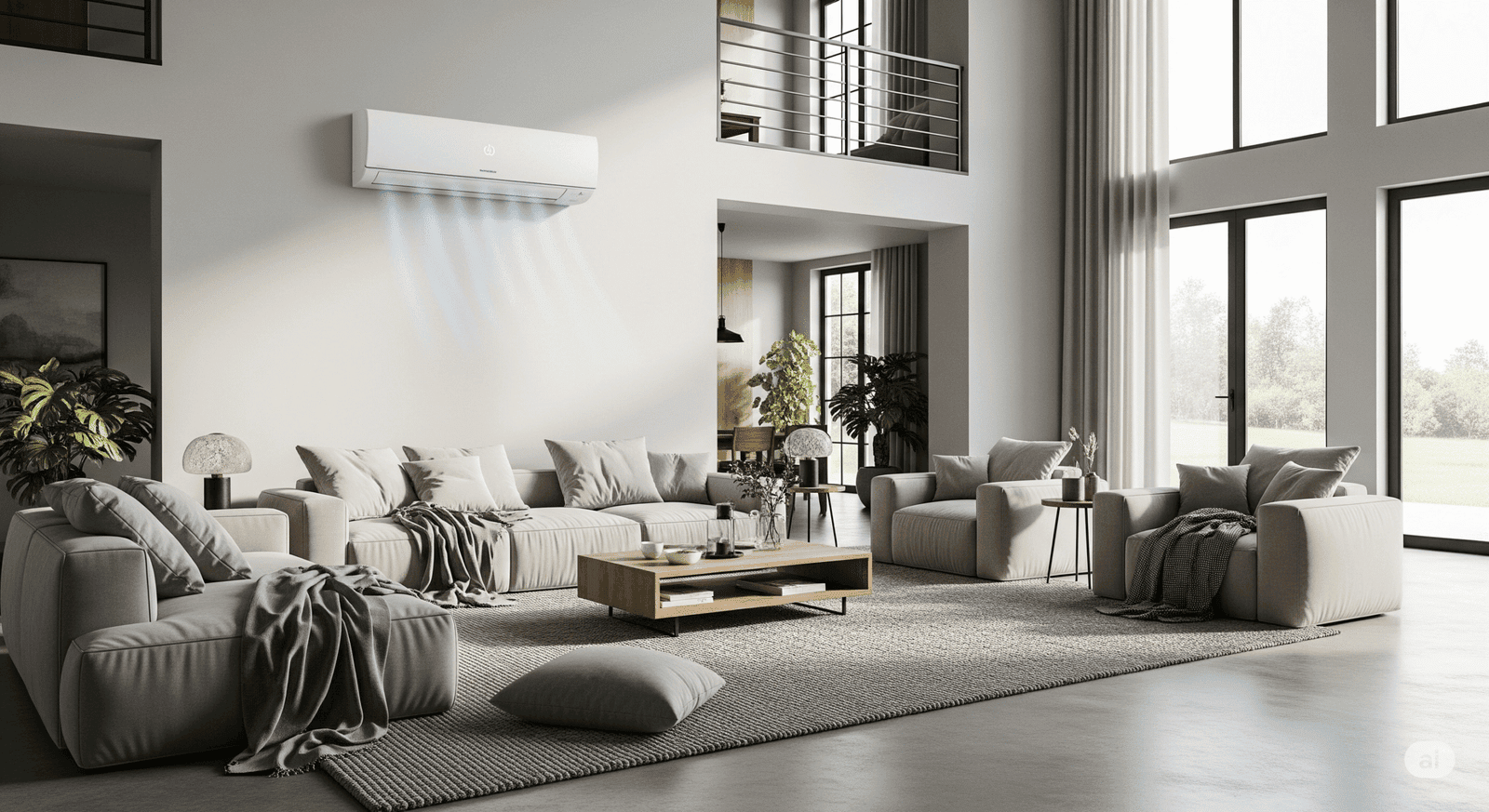The Complete Guide to Choosing the Best AC for Your Home Size
- Admin
- August 6, 2025
- No Comments
Other benefits are more necessary than simply keeping your house cool when selecting an air conditioner (AC). Fitting the AC’s ability to cool to the size of your room is the most important decision when choosing one. All the information you require to select the ideal air conditioner for your home size will be included in this guide.
1. The Significance of Size
Bigger isn’t always more effective when relating to air conditioners. A large unit could chill the space too quickly without properly removing moisture from it, creating a wet yet cold atmosphere. A small unit, on the other hand, will have difficulties cooling the area, running nonstop and increasing energy costs.
Appropriate size guarantees:
- Effective functioning.
- Improved regulation of humidity.
- increased unit lifetimes.
- Reduced use of energy.
2. Types of Air Conditioners
Selecting the type of AC is the next step after finding your needed Wattage. Various systems are appropriate for various home sizes and requirements.
A. Window air conditioners
- Ideal for: best for only one room.
- Advantages: Low cost and simple installation.
- Drawbacks: Reduces aesthetics and blocks windows.
B. Traveling air conditioners
- Ideal for: Short-term or small spaces.
- 8,000 to 14,000 BTUs is the capacity.
- Advantages: It can take anywhere.
- Drawbacks: It is noisy not so powerful.
C. Systems with Split Air Conditioning
- Ideal for: It is best for medium size homes.
- Advantages: silent, effective, and window-blocking-free.
- Drawbacks: More expensive up front and installation is necessary.
D. AC systems that are central
- Ideal for: It is best for the whole house.
- Advantages: It has the ability to cool the whole house.
- Drawbacks: Pricey and needed wiring.
E. Mini-Split Systems Without Ducts
- Ideal for: Homes without pipelines.
- Zone-specific capacity varies.
- Advantages: Effective, adaptable zone control.
- Drawbacks: More expensive per unit, indoor units are visible.
3. Reacting to the Environmental Conditions
- A little more capacity may be required for rooms that spend the most of the day in direct sunshine.
- If the air conditioner will be used in a kitchen because of the heat from cooking appliances, add 4,000 BTUs.
- You will want additional cooling power if the ceiling is higher than eight feet.
- If the space is usually occupied by more than two people, add more capacity per person.
- Homes in hotter climates may need more capacity while homes in cooler regions may need less.
4. The Importance of Energy Efficiency
Over the course of its life, an energy-efficient air conditioner can save you many hundreds of money. Check for these signs:
A. Ratio of Energy Efficiency
Better efficiency is indicated by a higher energy efficiency ratio. An energy efficiency ratio of 12 is more effective than one of 10, for instance.
B. Seasonal energy efficiency ratio
Better performance is indicated by a higher seasonal energy efficiency rating, which is mainly used for central and mini-split systems.
C. Certification as an Energy Star
This label certifies that the air conditioner satisfies or beyond the U.S. EPA’s energy efficiency standards.
5. Suggestions for Features
The following extra features increase efficiency and comfort:
- Temperature is automatically adjusted via programmable thermostats.
- Sleep Mode: Lowers power and noise levels at night.
- Function of a Dehumidifier: Lowers humidity for increased comfort.
- Smart Connectivity: Enables smartphone-based remote control.
- Variable speed fans save energy by adjusting power according to demand.
6. Setup and Upkeep
Setup
- DIY: Portable and window units are frequently do-it-yourself options.
- Professional: To guarantee performance and prevent problems, split, mini-split, and central air conditioning systems should be installed by professionals.
Upkeep
- Every month, clean or replace the filters.
- Every year, check and clean the coils.
- Make sure there are no blockages in the ducts or fans.
- Plan on having the centralized systems inspected by professionals once a year.
7. Suggestions by Size of House
- Mini Apartment Portable or window air conditioners are required.
- In medium home split ACs are required.
- In larger homes central ACs are required.
8. Features to Take Into Account
Features that improve comfort and save energy use are available in modern AC units:
- Automatically modifies the temperature according to what you want.
- Use smartphone apps for controlling your air conditioner.
- Carefully control the cooling output to increase efficiency and comfort.
- Overnight, lower usage of energy without sacrificing comfort.
Conclusion
I would like to say that a balance between size and qualities is necessary when selecting the best air conditioner for your house. You may get an air conditioner that offers the most relaxation without wasting energy or money by knowing your needs and the space you have, then using Watt measurement as an example. The correct decision makes all the difference, whether you’re cooling a single room or a whole house.
You may invest in an appliance that saves energy costs and maintains comfort in your house by calculating your needs and knowing your possibilities. Remember that installing the proper AC improves the efficiency and comfort of your house in addition to providing cooling.



